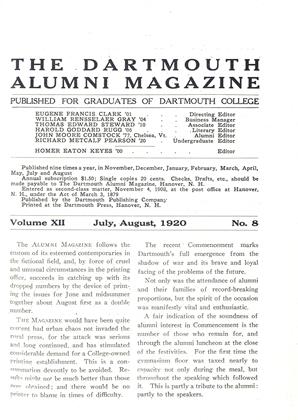Friends of the Christian Association, among the alumni body, will be interested in the re-establishment of the Dartmouth in Turkey work, which took place during the spring of the present year.
Graduates of the years between 1909 and 1913 will recall the establishment of the first "Dartmouth in Turkey" during those years. Although not officially a representative of the Christian Association, the project had its inception in 1910 when Robbins Barstow, 1913 went to teach in the American Board School in Mardin, in southern Asia Minor After his two years term had expired, he returned to college for his senior year.
It was natural that his friends among the undergraduates should have been interested in his missionary venture. On his return to college, this interest was crystalized in the formation of the Dartmouth in Turkey Committee, with the object of sending another Dartmouth man to Turkey to continue the work started by Barstow.
Funds were finally secured, and in the fall of 1913, E. W. Jahn '13, sailed as the first representative of the "Dartmouth in Turkey" work. Unfortunately, the outbreak of the world war in 1914, along with other unfavorable conditions made it seem advisable for Jahn to return to America, after only one year's service.
As soon as the armistice was signed, the Alumni Committee of the Christian Association began to consider the reestablishment of the Dartmouth in Turkey project. After much investigation, and conference with the officers of the American Board, it was decided to reestablish at Marsovan, in western Asia Minor, and as the Dartmouth in The Near East work, rather than Dartmouth in Turkey.
The delay in arranging the political future of certain sections of Asia Minor made it necessary to postpone the reopening of the work until the present year. Finally, in February, 1920, Walter B. Wiley 'lB sailed for Marsovan, having been chosen as the man to go out on the reestablishment.
He arrived on the field early in April, and has just finished his first term as a teacher in English at Anatolia College, in Marsovan. This is one of the chain of American Colleges in the Near East that have so vitally affected the life of the country. Along with Robert College at Constantinople, and the Syrian Protestant College at Beirut, it has stood as a beacon of light, in a land where higher education has been at a premium.
Rev. George E. White, President of Anatolia College, writes as follows about the impression that Mr. Wiley has already made:
"There are about 150 eager lads in attendance, all preparatory students, with more orphan boys than that in the same premises, and as many girls as boys. The teaching staff includes four Americans, four Armenians, five Greeks, one Russian, and one Turk. This is the situation into which your man has come and where he is already indispensable. He will probably become the head teacher in "the English departmenthe is the one American besides myself on the ground who preaches; he has an exceedingly useful place in the Sunday School and personal work among the students, with Y.M.C.A. work taking shape; and he is everybody's friend. Anatolia knows Dartmouth through Dr. Marden, one of the foremost surgeons, Mr. Tuck, American Consul at Samsoun, and now Walter Wiley. If this is characteristic Dartmouth manhood, your standard must be at the very top."
In the last normal year before the World War (1913-4) the enrollment of the college and preparatory school was 405 and was divided among the different nationalities as follows:
Armenian 157 Greek 194 Russian 32 Turkish 16 Scattering 6
The faculty consisted of 30 members, of whom eight were Americans, and the balance graduates of the College, with advanced degrees. All of the instruction is in English, except as each student is required to study his native language.
On account of the massacres of Armenians in the districts surrounding the College, and the drafting of the Greek boys into the army, the attendance has been greatly affected by the war. Word recently received indicates that it was found feasible to reopen only the preparatory department for the first two terms. It is expected that the collegiate department will reopen in the fall, with a freshman class.
Wiley is supported jointly by the undergraduate Christian Association and the Alumni Committee. The plans as far as they have been made look towards a gradual expansion of Dartmouth's interest in the work, until perhaps three or four graduates are on the staff of the college. It is hoped that eventually the project will be backed by the College as a whole, rather than by the Christian Association alone.
The interest of Dartmouth men in Marsovan is increased by the fact that Dr. Jesse K. Marden '95 has been for many years in charge of the American Board Hospital in. the city. He was at his post during the larger part of the war, and is recognized as one of the foremost American doctors in the Near East.
 View Full Issue
View Full Issue
More From This Issue
-
 Article
ArticleCOMMENCEMENT 1920
July 1920 By PHILIP SANFORD MARDEN '94 -
 Article
ArticleGEORGE P. MARSH, 1820
July 1920 By JOHN COTTON DANA '78 -
 Article
ArticleABSTRACT OF MEETING OF TRUSTEES, JUNE 21, 1920
July 1920 -
 Class Notes
Class NotesCLASS OF 1900
July 1920 -
 Article
ArticleDARTMOUTH OF THE FUTURE
July 1920 By HOMER EATON KEYES '00 -
 Article
ArticleBASEBALL
July 1920
Article
-
 Article
ArticleAlumni Council Meets in Chicago
JANUARY 1929 -
 Article
ArticleStudy Hospital Plan
January 1940 -
 Article
ArticleMasthead
November 1955 -
 Article
ArticleTHE COLLEGE
November 1949 By C.E.W. -
 Article
ArticleA STUDY OF THE OCCUPATIONS OF ALUMNI
April 1926 By Elwood T. Dickinson '24 -
 Article
ArticleWhat of the Senior Fellows?
May 1941 By THEODORE WACHS JR. '41


